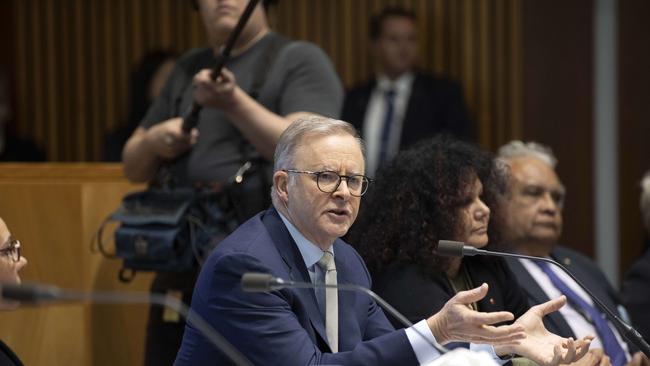Goodwill the essence to deciding on a Voice
The genuine goodwill and understandong of the Australian public breeds confidence that there will be an Indigenous Voice to Parliament, writes Dean Parkin
Opinion
Don't miss out on the headlines from Opinion. Followed categories will be added to My News.
The practicality of Australians is one of our most enviable national character traits.
From the generations of volunteer firefighters who work tirelessly to keep their communities safe and the tradies that rock up to repair flood damage to our preference for the simple pleasure of a snag in a slice of bread at Bunnings, we are a nation that likes to keep things simple and focus on the things that matter.
We prefer rolling up the sleeves to lofty speeches; practical outcomes over symbolism.
Now the Melbourne Cup is out of the way and end-of-year parties are booked in, we’re on the run-in into Christmas and the summer break – what will be the first relatively normal one in three years.
Inevitably at the end of January there’ll be the annual conversation about the appropriateness of celebrating our national day on January 26.

That conversation might feel a bit different this year, because in 2023 Australia will be contemplating perhaps the most important practical change we have made to the Constitution – the nation’s founding document – in decades.
After the pandemic experience of the past couple of years, we have all learned a bit about keeping things in perspective, looking at events in context. I’m optimistic this will serve the nation well in the conversation about the constitutional recognition of Aboriginal and Torres Strait Islander people.
The Prime Minister has said that a referendum is on the cards for the coming financial year.
So here, I’d like to offer three pieces of context.
First, the recognition of Aboriginal and Torres Strait Islander people has been supported by prime ministers of all persuasions since John Howard in 2007. Recognition is a simple statement of fact that Aboriginal and Torres Strait Islander people were the first people here and form the oldest continuing culture on earth.
This is something that, over the course of my lifetime, has changed from an acknowledged fact to a source of pride for the whole Australian nation.
Second, Indigenous people were asked several years ago what constitutional recognition should look like. In response, after thousands of conversations across the country through the Uluru Dialogues, Aboriginal and Torres Strait Islander people said that recognition should come in the form of a Voice to Parliament.
And this is important because a Voice speaks to that national preference for practicality over symbolism.
Why do something if it is not going to make a difference?
This leads to the third important bit of context.
Many people living in Australia don’t have close relationships with Aboriginal and Torres Strait Islander people. They may not even know a single Indigenous person.
But they intuitively understand that the quality of life for many Aboriginal and Torres Strait people should be better and that something has to change.
Constitutional recognition through a Voice to Parliament is a chance for the whole country to join in making a practical difference. Aboriginal and Torres Strait Islander people face many challenges that can only be solved by involving the people on the ground who really understand the issues in their communities.

People often suggest to me that we can just use the existing system to try to fix the problems.
If it were that easy, it would have already been done by now.
Bureaucrats in Canberra and politicians from both sides have been trying for decades.
They have meant well but, by themselves, have not been able to find lasting solutions.
When we talk about approaching our first normal summer for a few years, it’s worth remembering what that normality looks like for Aboriginal and Torres Strait Islander people on so many measures: a yawning gap on rates of imprisonment, life expectancy, unemployment, education and family violence.
Enacting constitutional recognition in a practical way, through a Voice, offers a meaningful route to address this that taps our great national preference for practical solutions over gestures and symbolism.
In fact, we get to do both.
By guaranteeing Aboriginal and Torres Strait Islander people a say over matters that affect us, we not only achieve meaningful Indigenous constitutional recognition, but we do it in a way that makes it a practical difference.
This is a very good deal for Australia.
No doubt the conversation about constitutional recognition in 2023 will be robust, as it should be in a democracy.
But the goodwill that exists is enormous in the Australian community and that, combined with our inherently practical nature, makes me confident that we are ready to come together for a successful referendum.
- Dean Parkin is CEO of From The Heart.


